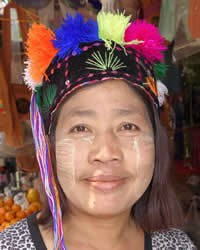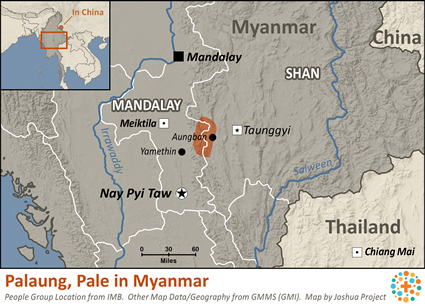The Palaung are one of the largest and most visually striking tribes in Myanmar. “Palaung” is the Burmese name for this group. They call themselves Ta-ang, which means “Rock people.” While some people call this group “Silver Palaung” due to their women’s appearance, the autonym of the Palaung Pale is “Daraarin.” Burmese sources list up to 15 different subgroups of Palaung in Myanmar, each wearing distinctive dress,1 while linguists have divided all the Palaung according to three distinct language groups, of which the Palaung Pale are the most populous.
Location: With a population of just under 300,000 people, the Palaung Pale inhabit a widespread area of northern Myanmar. Most live in nine districts of Shan State, from the Thai border in the east to the Chinese border in the north, while others live in the Mandalay and Sagaing regions. Palaung Pale villages are often located in cultivated areas at elevations between 5,000 and 8,500 feet (1,520 to 2,600 meters). Non-cultivated land is covered in forests. An additional 11,000 Palaung Pale people live in China’s Yunnan Province, while 6,000 Palaung Pale people have settled in the mountains of northern Thailand’s Fang District.
Language: The language spoken by Palaung Pale people is called Ruching. It is part of the Mon-Khmer branch of the Austro-Asiatic language family and contains six dialects. Depending on their location, Palaung Pale people also speak Burmese, Tai Lue, and Shan, and they use the scripts of those groups for writing.
Until the late 1950s the Palaung had their own prince who ruled from Namhsan in Tangpeng State, which existed from 1793 until the principality was abolished by the new Burmese Union in 1959. Fighting continued between the Burmese and the Palaung until a 1991 ceasefire. The Ta’ang National Liberation Army has emerged as one of the most powerful anti-government forces during the current Myanmar civil war. China, tired of having a war waged on its southern border, warned the TNLA leaders to stop fighting in 2024. When they refused to comply, China announced they were siding with the Myanmar junta to crush the many ethnic militias in the conflict.
In 1910 it was said of the Palaung: "They are conspicuous among the hill tribes of this region by their universal adoption of Buddhism, their tea culture, and the variety and elaboration of their women's dresses. For a tribe that lives so consistently on the hilltops as they do, they are a wonderfully advanced community." In the past the Palaung area prospered due to tea production, timber, and mining. They remain relatively wealthy today compared to other ethnic groups in Shan State.
The Palaung Pale are considered a strong Buddhist group that are not open to change. It is fascinating that they believe the Buddhist Lord of Mercy, Maitreya, will appear and establish justice and peace on the earth. According to 1920s missionary Alexander MacLeish, “No figure in all their religious horizon more quickly rouses their interest…. When Palaung build a new home, they always add an extra room in reserve for Lord Maitreya. The room is cleaned regularly even though members of the household never use it.”
In 1953, the first Kachin missionary traveled east to Shan State to reach the Palaung people. A school was established, and Ai Sai became the first Palaung preacher. After initially experiencing an encouraging response, the work appears to have fallen into decline. Today, only a tiny remnant of less than one percent of Palaung Pale people are Christians. New believers often face persecution and are ostracized from the community. Using the Burmese script, the Bible was translated by missionaries and published in 2021, but appears to have been used selectively, and is not available for widespread distribution. The Jesus film in the Ruching language has been used to share the Gospel with many Palaung Pale people.
Scripture Prayers for the Palaung, Pale in Myanmar (Burma).
| Profile Source: Asia Harvest |


























